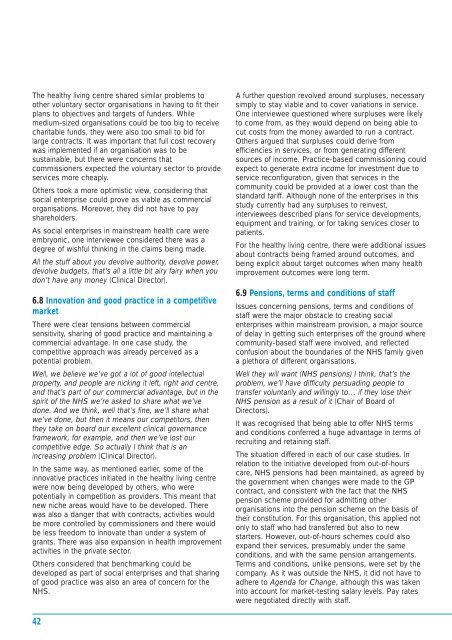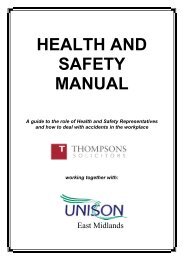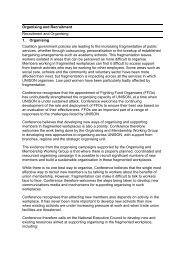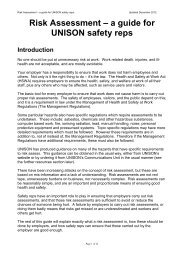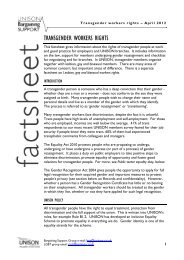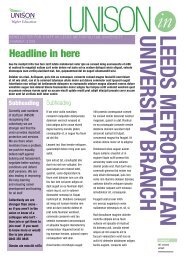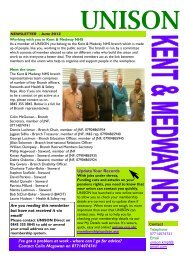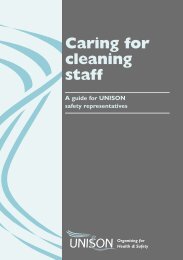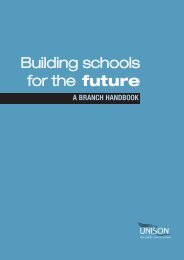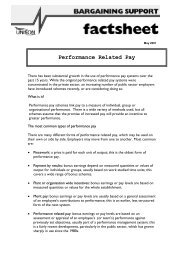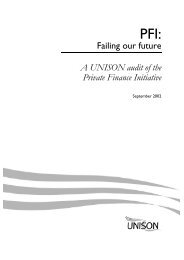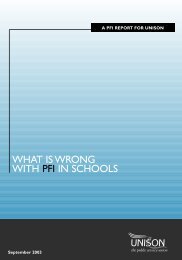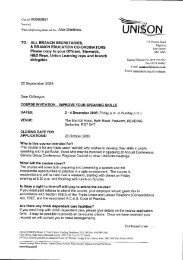Social Enterprises and the NHS - Unison
Social Enterprises and the NHS - Unison
Social Enterprises and the NHS - Unison
You also want an ePaper? Increase the reach of your titles
YUMPU automatically turns print PDFs into web optimized ePapers that Google loves.
The healthy living centre shared similar problems to<br />
o<strong>the</strong>r voluntary sector organisations in having to fit <strong>the</strong>ir<br />
plans to objectives <strong>and</strong> targets of funders. While<br />
medium-sized organisations could be too big to receive<br />
charitable funds, <strong>the</strong>y were also too small to bid for<br />
large contracts. It was important that full cost recovery<br />
was implemented if an organisation was to be<br />
sustainable, but <strong>the</strong>re were concerns that<br />
commissioners expected <strong>the</strong> voluntary sector to provide<br />
services more cheaply.<br />
O<strong>the</strong>rs took a more optimistic view, considering that<br />
social enterprise could prove as viable as commercial<br />
organisations. Moreover, <strong>the</strong>y did not have to pay<br />
shareholders.<br />
As social enterprises in mainstream health care were<br />
embryonic, one interviewee considered <strong>the</strong>re was a<br />
degree of wishful thinking in <strong>the</strong> claims being made.<br />
All <strong>the</strong> stuff about you devolve authority, devolve power,<br />
devolve budgets, that’s all a little bit airy fairy when you<br />
don’t have any money (Clinical Director).<br />
6.8 Innovation <strong>and</strong> good practice in a competitive<br />
market<br />
There were clear tensions between commercial<br />
sensitivity, sharing of good practice <strong>and</strong> maintaining a<br />
commercial advantage. In one case study, <strong>the</strong><br />
competitive approach was already perceived as a<br />
potential problem.<br />
Well, we believe we’ve got a lot of good intellectual<br />
property, <strong>and</strong> people are nicking it left, right <strong>and</strong> centre,<br />
<strong>and</strong> that’s part of our commercial advantage, but in <strong>the</strong><br />
spirit of <strong>the</strong> <strong>NHS</strong> we’re asked to share what we’ve<br />
done. And we think, well that’s fine, we’ll share what<br />
we’ve done, but <strong>the</strong>n it means our competitors, <strong>the</strong>n<br />
<strong>the</strong>y take on board our excellent clinical governance<br />
framework, for example, <strong>and</strong> <strong>the</strong>n we’ve lost our<br />
competitive edge. So actually I think that is an<br />
increasing problem (Clinical Director).<br />
In <strong>the</strong> same way, as mentioned earlier, some of <strong>the</strong><br />
innovative practices initiated in <strong>the</strong> healthy living centre<br />
were now being developed by o<strong>the</strong>rs, who were<br />
potentially in competition as providers. This meant that<br />
new niche areas would have to be developed. There<br />
was also a danger that with contracts, activities would<br />
be more controlled by commissioners <strong>and</strong> <strong>the</strong>re would<br />
be less freedom to innovate than under a system of<br />
grants. There was also expansion in health improvement<br />
activities in <strong>the</strong> private sector.<br />
O<strong>the</strong>rs considered that benchmarking could be<br />
developed as part of social enterprises <strong>and</strong> that sharing<br />
of good practice was also an area of concern for <strong>the</strong><br />
<strong>NHS</strong>.<br />
42<br />
A fur<strong>the</strong>r question revolved around surpluses, necessary<br />
simply to stay viable <strong>and</strong> to cover variations in service.<br />
One interviewee questioned where surpluses were likely<br />
to come from, as <strong>the</strong>y would depend on being able to<br />
cut costs from <strong>the</strong> money awarded to run a contract.<br />
O<strong>the</strong>rs argued that surpluses could derive from<br />
efficiencies in services, or from generating different<br />
sources of income. Practice-based commissioning could<br />
expect to generate extra income for investment due to<br />
service reconfiguration, given that services in <strong>the</strong><br />
community could be provided at a lower cost than <strong>the</strong><br />
st<strong>and</strong>ard tariff. Although none of <strong>the</strong> enterprises in this<br />
study currently had any surpluses to reinvest,<br />
interviewees described plans for service developments,<br />
equipment <strong>and</strong> training, or for taking services closer to<br />
patients.<br />
For <strong>the</strong> healthy living centre, <strong>the</strong>re were additional issues<br />
about contracts being framed around outcomes, <strong>and</strong><br />
being explicit about target outcomes when many health<br />
improvement outcomes were long term.<br />
6.9 Pensions, terms <strong>and</strong> conditions of staff<br />
Issues concerning pensions, terms <strong>and</strong> conditions of<br />
staff were <strong>the</strong> major obstacle to creating social<br />
enterprises within mainstream provision, a major source<br />
of delay in getting such enterprises off <strong>the</strong> ground where<br />
community-based staff were involved, <strong>and</strong> reflected<br />
confusion about <strong>the</strong> boundaries of <strong>the</strong> <strong>NHS</strong> family given<br />
a plethora of different organisations.<br />
Well <strong>the</strong>y will want (<strong>NHS</strong> pensions) I think, that’s <strong>the</strong><br />
problem, we’ll have difficulty persuading people to<br />
transfer voluntarily <strong>and</strong> willingly to… if <strong>the</strong>y lose <strong>the</strong>ir<br />
<strong>NHS</strong> pension as a result of it (Chair of Board of<br />
Directors).<br />
It was recognised that being able to offer <strong>NHS</strong> terms<br />
<strong>and</strong> conditions conferred a huge advantage in terms of<br />
recruiting <strong>and</strong> retaining staff.<br />
The situation differed in each of our case studies. In<br />
relation to <strong>the</strong> initiative developed from out-of-hours<br />
care, <strong>NHS</strong> pensions had been maintained, as agreed by<br />
<strong>the</strong> government when changes were made to <strong>the</strong> GP<br />
contract, <strong>and</strong> consistent with <strong>the</strong> fact that <strong>the</strong> <strong>NHS</strong><br />
pension scheme provided for admitting o<strong>the</strong>r<br />
organisations into <strong>the</strong> pension scheme on <strong>the</strong> basis of<br />
<strong>the</strong>ir constitution. For this organisation, this applied not<br />
only to staff who had transferred but also to new<br />
starters. However, out-of-hours schemes could also<br />
exp<strong>and</strong> <strong>the</strong>ir services, presumably under <strong>the</strong> same<br />
conditions, <strong>and</strong> with <strong>the</strong> same pension arrangements.<br />
Terms <strong>and</strong> conditions, unlike pensions, were set by <strong>the</strong><br />
company. As it was outside <strong>the</strong> <strong>NHS</strong>, it did not have to<br />
adhere to Agenda for Change, although this was taken<br />
into account for market-testing salary levels. Pay rates<br />
were negotiated directly with staff.


